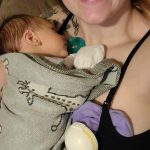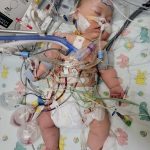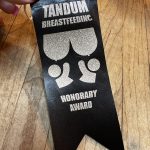In celebration of World Breastfeeding Week, I have a milestone to share. As of this month, I have been pregnant, breastfeeding, or both for ONE DECADE. Consecutively. Ten years that my body has been providing nourishment to someone other than myself. I share this because this is also my last World Breastfeeding Week as a nursing mom.
Trigger warning
This post contains discussion of content that could be triggering for people with pregnancy/childbirth/breastfeeding/chestfeeding/bottlefeeding/babyfeeding traumas or those who are triggered by discussion around medical abuse and mistreatment. Take care of you.
My parenting journey started in August 2013, when I found out I was pregnant with my oldest. I nursed him through my pregnancy with my middle kid and for several months after. My second continued to nurse through my pregnancy with my third, and again tandem nursed beyond her arrival. That’s three pregnancies with overlapping breastfeeding journeys over the span of a decade. If you’re trying to do the math, don’t worry; I break down the details on how old they were when they weaned below; just after the section about judgement. This past November, I had a hysterectomy, so no more babies for me…unless they come to our family by some other way than via my uterus, because I don’t have one of those anymore.
In the Naval hospital where my oldest was born, it is a tradition to play Brahms’ Lullaby as the nurse wheels you to your room with your fresh little newborn snuggled in your arms. When I had my hysterectomy, it was performed in the Labor & Delivery unit of another large hospital. I was prepped for my surgery, and as they wheeled me towards the OR, another mom was wheeled past in the opposite direction with her fresh little newborn snuggled in her arms. We both smiled softly. Then, I heard the sound of Brahms’ Lullaby filling the halls. I felt every emotion I have experienced as a mother rise up in my chest in that moment and tears started streaming down my face. It was cathartic. The next thing I remember is waking up in recovery. All of those emotions came rushing back. The smell of the hospital, the swelling in my abdomen, the excruciating pain that engulfed my pelvis, the blood…and Brahms’ Lullaby.
A partial hysterectomy was one option presented to me to address the complications I was having with prolapse related to postpartum recovery. One of multiple options presented. Meaning I CHOSE to have a hysterectomy. My heart breaks for those who didn’t get to choose. Those for whom it was an unwanted, unexpected, life-saving measure. Those who aren’t ready for that chapter to come to a close. I can’t imagine the impact that would have on someone who is already grieving the loss of their ability to CHOSE whether or not to have more babies in the future. Or those who lost a baby and are then wheeled down that same hall to the tune of Brahms Lullaby. My heart shattered for a lot of parents that night. So if you ever see me get emotional if that song plays, now you know why.
My kids have three very different birth stories, each of which started a whole new chapter of my breastfeeding journey. It hasn’t always been easy. There were a lot of barriers to overcome. I acknowledge that there is a lot of privilege in having access to the resources necessary to overcome those barriers, and in having your voice heard when advocating for yourself and your baby. These issues are not limited to breastfeeding, but that is where I am going to focus with it being World Breastfeeding week and all. I will, however, include some links and information about other significant ways we as a society are failing families in the postpartum period at the end of this story, because it is important to bring all of these things to light.
With my first, I had intended on having an unmedicated birth. When I was admitted, I was walking to the delivery room and I climbed onto the bed, a shot of pain went from my back down both legs and my back started spasming. I told the nurse I needed to change positions because I was in excruciating pain. She proceeded to grab my pregnant belly, HARD, and said “You’re not even having a contraction. If you’re going to be like this there is no way you are going to make it without an epidural.” I told her it wasn’t the contractions, that I felt like I had a pinched nerve, and if I could just switch positions it would probably stop. “I will send the anesthesiologist” she said, “Just in case.”
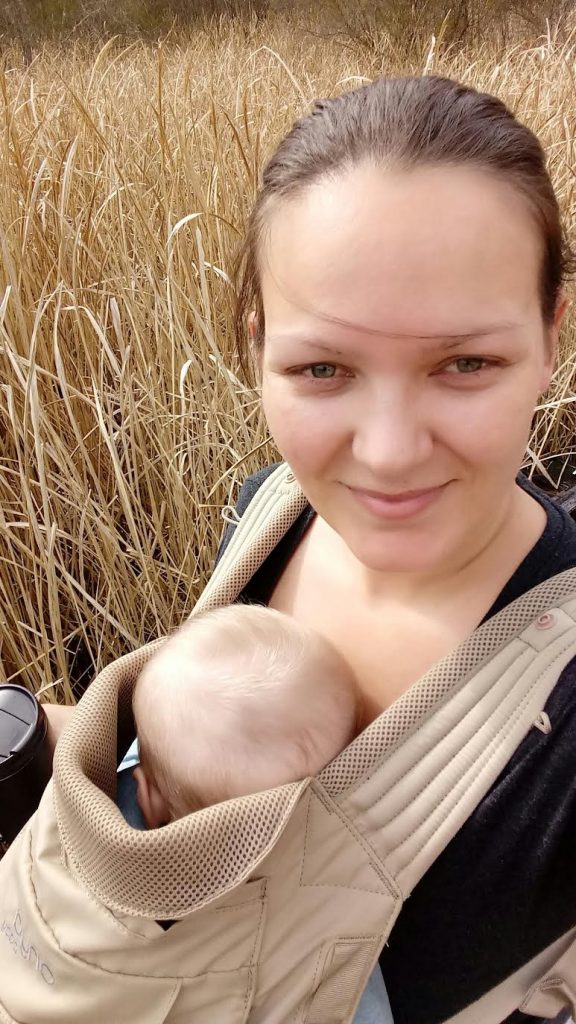
When she walked away, I repositioned my body and put a pillow under one hip. The shooting pain stopped, but I still questioned my ability to handle the pain of childbirth after that interaction. So when the anesthesiologist arrived, I reluctantly agreed to an epidural. The epidural only worked on one side of my body, my contractions slowed and my son’s heart rate dropped when I laid on my left side. They gave me Pitocin. Broke my water. Gave me more Pitocin.
The nurse came in and said that there was meconium in the fluid when they broke my water, and that immediately after birth they would have to take him for examination, meaning I wouldn’t be able to hold him immediately. My initial plan was for him to lay on my chest, delay cord clamping and have a golden hour with my new little bundle of joy. I swallowed my grief, knowing that was what was best for my baby in that moment.
A few hours later, my son arrived. My husband cut the umbilical cord, and I got a tiny glimpse of him before he was scooped up and swept away to the other side of the room. When I finally got to hold him, he was already clean and wearing a little pink and blue hat. The whole process seemed like a blur. When my husband laid him on my chest for the first time, my life changed forever. I was someone’s mom. There was still chaos in the room as I was trying to get him to latch for the first time, but he did, and thus began my breastfeeding journey. When the room was quiet, we got our golden hour before being moved to recovery to the tune of Brahm’s Lullaby.
Everything went well with breastfeeding the first day, I had a visit from a lactation consultant who checked his latch, answered my questions and left me some educational pamphlets. That night, my son woke up screaming and I couldn’t console him. I paged the nurse. He was running a fever. After examining him, they decided it was best to have him stay the night in the NICU for observation, especially since there had been meconium in the amniotic fluid. They asked if I wanted to be woken up to walk down and breastfeed or if I wanted them to give him a bottle. I told them that it was my intention to exclusively breastfeed, so they could wake me up at any time to go feed him. So, they did.
It was the early hours of the morning before the sun began to rise. I was escorted to the NICU by a Navy Corpsman and they showed me to a chair where I could nurse. All went well on one side, however, as soon as I tried to position him on the other side, he started screaming. The Corpsman came over and I explained what was going on. She asked to see my feeding records, which the hospital makes you keep while you are there. Then she said, “Well, he needs to nurse on both sides or he isn’t going to get enough. You’re going to have to keep trying or give him a bottle. The lactation consultant won’t be in until 8am and he can’t wait that long.”
So I tried again. More screaming. The whole time the Corpsman is sitting there watching me impatiently. I set my son in the bassinet and said, “You standing there staring at me is stressing me out. If I don’t calm down, he won’t calm down, and I won’t be able to do this. I need space.” She closed the curtain and walked away. I took a deep breath and let out a sigh of relief, but before I could try again, the curtain shot back open. “Look,” she said, “if you’re unable to do it, we will have to give him a bottle. If you don’t agree to it, I will have to call my Commanding Officer. Do you understand that?”
I was 28 years old, and I grew up in a military family; spending 18 years as a military child and then four years as a military spouse. I also volunteered a Rape Crisis Advocate for a few years before I was married. I knew my rights. There is privilege in that. That threat probably would have caused a younger mom; a new military spouse; a young, enlisted service member, or anyone else who had reason to fear consequences of non-compliance, to cave and just do as they were being told.
I stood there, ass out, postpartum panties on display, bleeding, sleep-deprived and emotionally exhausted. I did not break eye contact. “I understand,” I said calmly. Then as she started to turn away, I said, “I hope you understand, that if you intend to override my parental rights and give him a bottle without the medical opinion of a doctor AND my consent, I will need to speak with your CO anyway.”
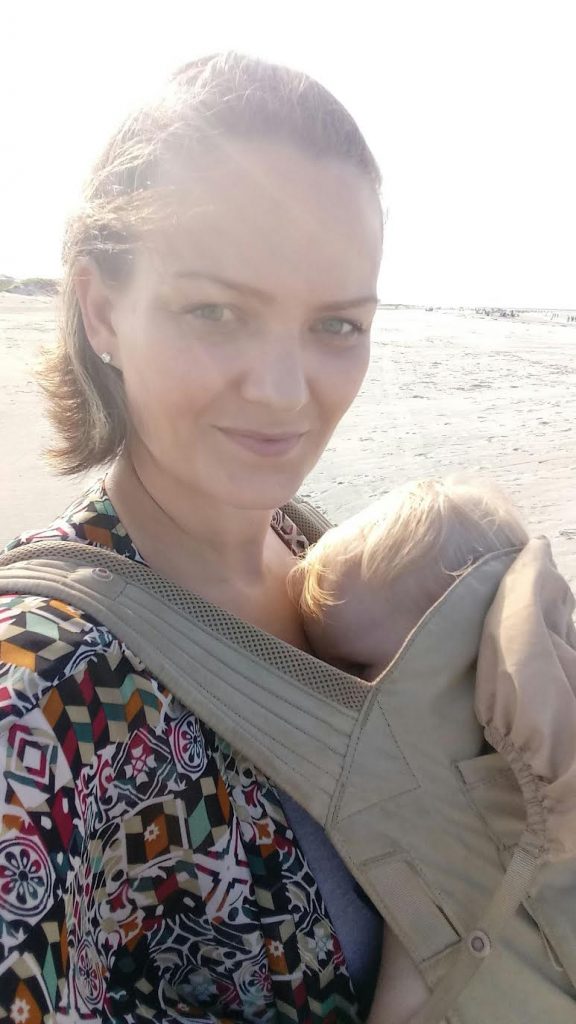
I don’t know how much longer she stood and stared at me, but it felt like forever. Eventually, she closed the curtain and walked away. I picked up my son, sat in the chair, and situated my Boppy pillow. The curtain opens slightly. The Corpman reaches through with a prepared bottle of formula and sets in on the shelf. “Just in case.”
The sun was starting to peak above the buildings and the sky lightened from black to navy. It was almost morning. Shift change would be soon. The lactation consultant would be in a few hours later. I had prepared for breastfeeding. I read about it; I took classes at the hospital; and I had access to information before going into it. I had read stories of moms who had breastfed with one breast after a single mastectomy. I learned about moms of multiples being able to nurse both babies. I had read about people who tandem nursed after nursing through pregnancy. I don’t know why that Corpsman was so adamant that my son had to be able to nurse on BOTH sides to be considered fed, but every nursing journey is different, and there are many babies that are nourished from the milk produced by one breast alone. So why should this situation be treated any differently? So, I latched my son on the first side again and he drifted back off to sleep. I wrote the time on his feeding log and in the side column I wrote, “L/R 10 minutes each side.”
The next day, I worked with the Lactation Consultant. There was nothing wrong with my boob. She showed me a couple different holding positions and he was able to nurse from both breasts as long as he wasn’t laid on his right side. She guided me in holding him in a way that allowed me to latch him on both breasts without having to do so. Then he failed his hearing test. There was a build up of fluid in his ear, along with inflammation, which likely caused pain when he laid on that side and was most likely what had triggered the fever in the first place. The condition resolved on its own and he was able to latch easily on both sides within days.

In the following weeks, as I was learning to navigate the challenges of nursing a newborn, he was slow to regain his birth weight. I received comments like “This is why I like bottle feeding, you know they are actually getting something.” “It’s not going to hurt to give him a bottle every now and then so you can get some rest.” I also saw all of the shame people flung at nursing moms when they nursed in public, and the criticism and judgement that came along with it.
At the time, nursing parents did NOT have legal protection to breastfeed their children in public. Due to the legislative action taking place in states all over the U.S., there was a lot of media coverage intended to drive controversy. Stories of harassment and discrimination circulated on social media, and the comments sections were full of scathing, misogynistic attacks on parents who chose to feed their babies in public; with or without a cover.
It took me a long time to feel comfortable nursing in public. I had family that was extremely supportive, and I had access to a local breastfeeding support group to help me get the hang of everything, but I still constantly felt like my decision to breastfeed, exclusively breast feed, continue to breastfeed after age one, and eventually, feed my babies in public, were being judged. These issues are not limited to breastfeeding.
People who choose to bottle feed are treated this way as well. People who chose to breastfeed but didn’t get the support they needed to continue as long as they wanted feel this way too. People who combination feed, use an SNS or G-Tube. We are all just feeding our babies. We deserve to be supported or left alone. Facing all the swirling stigma and controversy over feeding choices, I shared a lot of content on social media regarding the benefits of breastfeeding and how to support breastfeeding parents and the right to breastfeed in public. It hit a nerve. It was not my intention to make those around me who did NOT breastfeed feel the same way as I did, but that is exactly what happened. Impact over intent. I was advocating for myself in a way that ignored the perspective of others. That is not what advocacy looks like. Seeing that content was triggering for people who had made different choices, faced different barriers, or did not have resources available to help them overcome the barriers to feeding their babies. I have learned and grown since then.
What I want to emphasize about my experience in the NICU, is that it is not aimed at people who CHOSE not to breastfeed, or at someone else put in my situation who CHOSE to use the bottle. It is aimed at the medical providers who put me I a position where MY right to make that choice was being threatened. My stance that night was not anti-formula. My stance was pro-patient rights. In the middle of the night, ONE person was trying to manipulate me into compliance, without the second opinion of another medical professional, or the involvement of a patient advocate.
So that brings us to judgement. I am not judging you. Your choices may have been similar, or may have been exactly opposite. We all love and feed our babies in the way that works best for us, and that is what matters. We all face judgement. If you choose not to breastfeed, they judge you. If you chose to exclusively breastfeed, they judge you. If you chose to use an SNS system instead of a bottle, they judge you. If you nurse past the age of one, they judge you. If you breastfeed in public the judgement came out in full force. If you nurse through pregnancy, tandem nurse, nurse a baby you didn’t birth yourself, use donated milk, donate milk to others, go back to work and pump, go back to work in general, become a SAHM…you guessed it…they judge you.
It’s divisive. It’s killing our communities. It needs to stop.

With that said, this is not to discount the importance of World Breast Feeding Week. I am incredibly grateful for the lactation consultants, dulas, midwives, nurses and advocates who get up every day and offer support and resources that meet the needs of their individual patients. Those resources are valuable and necessary and give the people who DO want to breastfeed, access to information they need to meet their individual goals.
Sometimes those goals evolve over time, mine certainly did. I didn’t start out looking to make milk for a decade, but had it not been for the lactation consultant at the Naval Hospital, my breastfeeding journey may have ended before I made it home.
My second was born in another large hospital after an emergency transfer from the birth center. I was transferred due to meconium in the amniotic fluid. The midwife who caught my son was amazing. I was able to deliver my baby in the position that worked for my body; kneeling, with my arms draped over the back of the bed. After she caught my son, she passed him up to me between my legs and she helped me reposition so he could lay on my chest while I delivered the placenta. We were able to delay cord clamping, and after my husband cut the umbilical cord, he was examined in a heated bassinet next to my bed. My postpartum recovery needs were important to my providers, and that was made clear in the care I received. In fact, that lovely human who caught my 10lb baby just celebrated her 1,000th birth. The difference in the way I was treated, and the impact of the care they dedicated to ensuring my son’s health and safety while also preserving those first few magical moments. This time around, I was the first person to look into my baby’s eyes.
My third was born in the front seat of a moving vehicle 11 minutes shy of the birth center with my husband driving, the older two kids in the back seat, and the midwife on speakerphone. As I realized that we were not going to make it on time, I repositioned myself, and as my daughter made her arrival, I caught her myself.
Upon arriving at the birth center, I waddled inside, bare-arsed, and holding a baby that was still attached to me by the umbilical cord. I’m guessing I’m not someone Canyon Medical Center will soon forget =) My midwives were amazing through it all. After I delivered the placenta, they delayed cord clamping, and you bet your ass I cut that umbilical cord myself that time around.
The midwives at Canyon Medial center offer home-visits after baby is born, so you don’t have to drag your broken body and leaky boobs down to a hospital to get baby weighed. She came to my home, and checked my daughter while I ate breakfast in bed. They were also there for me when I needed them the most. Afte the fact when I was struggling with postpartum anxiety and depression, most medical providers would have ‘cut the cord,’ and left me to navigate postpartum mental health complications on my own. They stuck with me and made sure that I received the mental healthcare I needed. I will be forever grateful for that.
To put things in perspective….I would chose another minivan birth before I would go back to the hospital in which my parenting journey began.
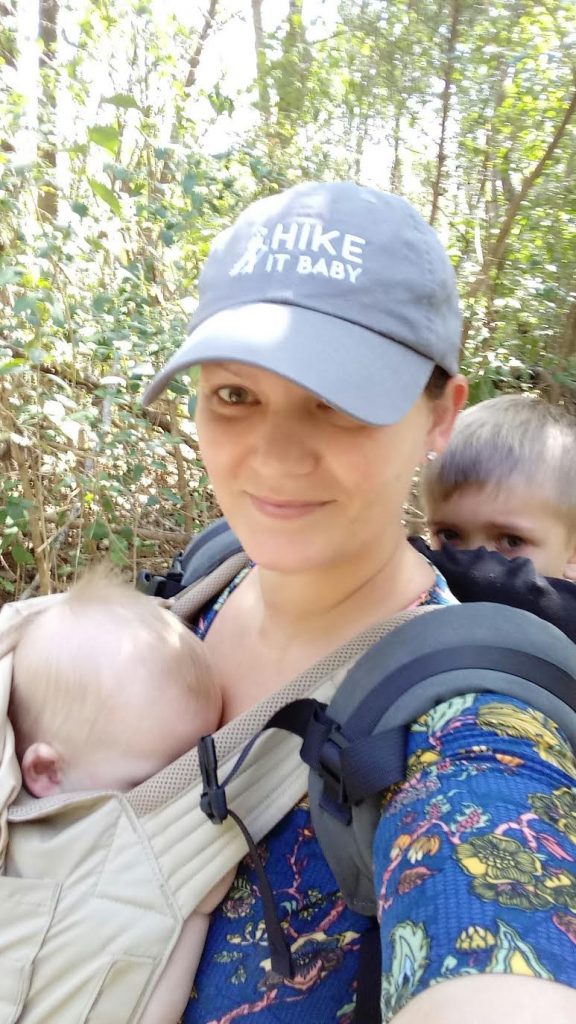
To wrap things up, here are some FAQs about my experience lactating for ten years, along with the math I promised you:
122 weeks of pregnancy. 40-42-40
82 weeks of breastfeeding while pregnant
Approximately 27 months of tandem-nursing
3,378 total days of lactating…so far.
Breastfeeding was much easier the second and third time.
There was zero engorgement after the birth of my second and third because my milk was already in business since 2014.
Nipple chaffing was still a thing with the second but not with the third.
I tried pumping with my first and second babies but experienced D-MER while pumping. It is a condition that essentially feels like a wave of impending doom right before a milk letdown. I couldn’t get either baby to take a bottle anyway, so I donated everything I had pumped to other nursing parents through Eats on Feets and Human Milk 4 Human Babies Global Network. I never ended up pumping with my youngest.
A major game changer for me was finding We Are OutGrown, formerly known as Hike it Baby, a 501c3 non-profit organization that has branches all over North America. It is free to join, and they host hikes, playdates and other outdoor activities to help families get outside from birth and beyond. They found me in the hazy fog of new motherhood and forever changed my parenting journey. It gave me a “No Judgement Zone,” where I could show up disheveled and sleep deprived and feel welcome and supported, no matter what. We held space for those who needed to feed a baby, change a baby, sooth a toddler or sling snacks to the older kids. We stopped. We waited. We made sure no hiker was left behind.
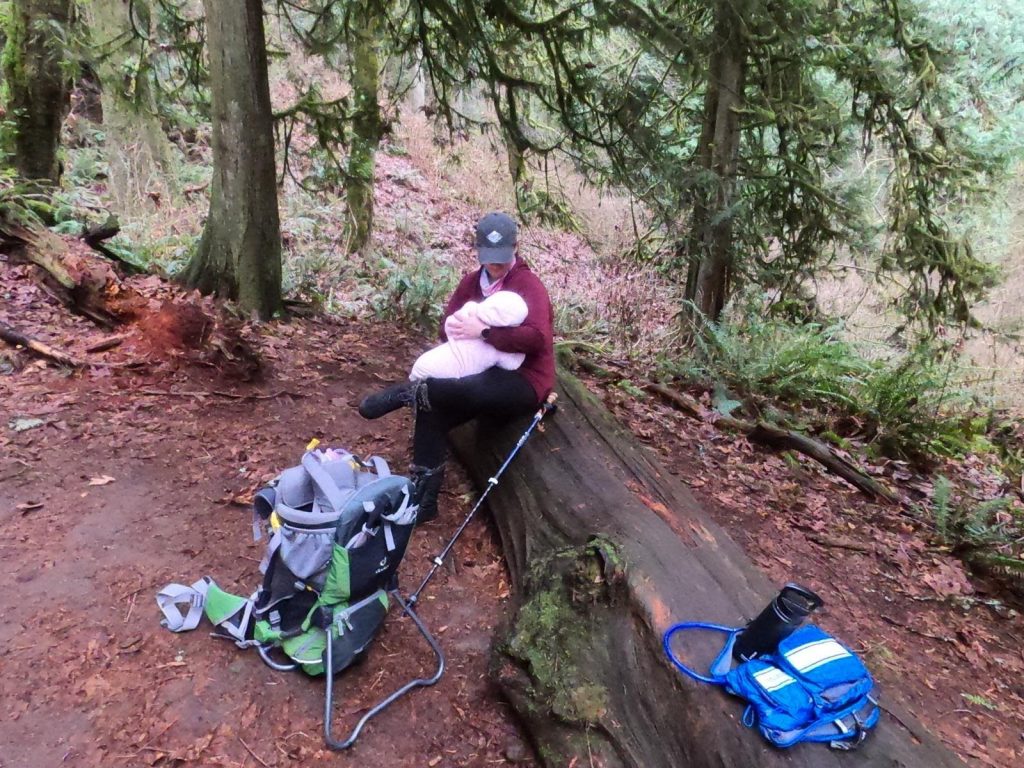
That was exactly what I needed in that chapter of life. Being a new parent can be isolating and lonely. It compounded the symptoms of postpartum depression and anxiety. It was hard to try to schedule going out around feeding and naps. Once I had my support network, I knew I wasn’t alone. I learned how to nurse in a baby carrier and have been able to hike thousands of miles and take tons of adventures with my children while they were tiny. In fact, over the past ten years, I think I have breastfeed in 40 U.S. States.
My first two children weaned the day after their 4th birthday. My original goal was to nurse to 12 months and then let them wean naturally after that….but they would have kept going so I cut ‘em off at 4. My choice. I became pregnant with my second when my first was almost 3. I nursed through the entire pregnancy and then tandem nursed for an additional 8 months. My second continued to nurse and when he was about 2.5 I became pregnant with my 3rd and last. I nursed through that entire pregnancy and tandem nursed for about 18 months before my second weaned. My youngest is still nursing. She is three and will turn four in the spring.
So with the turn of the season my breastfeeding journey will end. I’m at peace with that, despite waves of nostalgia that hit when I think of those long nights up cluster feeding. Never thought I would say that.
All of that to say, I’m amazed by the power of mother nature.
I’m thankful for the time spent snuggling my babies in the wee hours of the morning while they nursed. I value the memories that I made with my babies and children out on the trail. I am grateful for those who were there for me and supported me through my journey, and for those who have dedicated countless hours to advocating in these spaces.
Above all, I am honored that these three little humans call me mom….well…sometimes they call me mom. I also answer to “Ma, Mama, Mommy, Mother, Giver of Life and MoooOOOOOOOOooooom!”
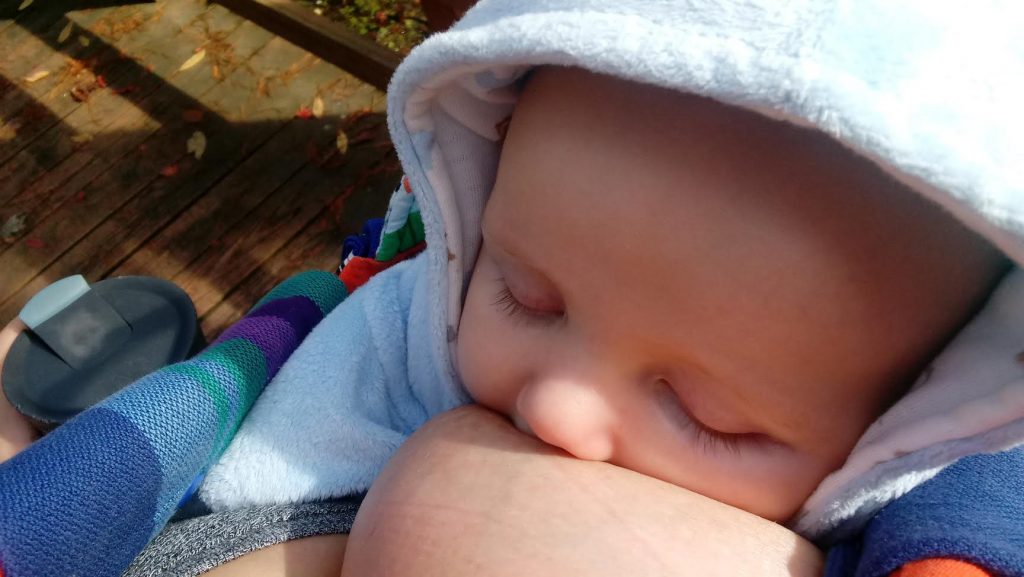
In closing, I want to leave you with some information that I hope you will take to heart:
According to the Wilson Center, “Globally, maternal mortality has decreased 43 percent since 1990; the United States is the only developed country where it has gone up.”
According to a 2019 study published by BioMed Central Public Health Journal, nursing parents who do not have access to Breastfeeding Support Programs are more likely to stop breastfeeding earlier than desired.
According to the Center for Disease Control, 60% of mothers do not breastfeed as long as they intend; with a great deal of racial/ethnic and economic disparities reflected by the data.
According to the American Journal of Managed Care, “Among 11 developed countries, the United States has the highest maternal mortality rate, a relative undersupply of maternity care providers, and is the only country not to guarantee access to provider home visits or paid parental leave in the postpartum period,’ referencing a recent report from The Commonwealth Fund. “Compared with any other wealthy nation, the United States also spends the highest percentage of its gross domestic product on health care.” And that “In the United States, non-Hispanic Black women are more than 3 times more likely to have a maternal death than White women. Non-Hispanic Black women are also significantly more likely to have a severe maternal morbidity event at the time of delivery.”
This needs to stop.
Happy World Breastfeeding Week
Nicholl Summers

